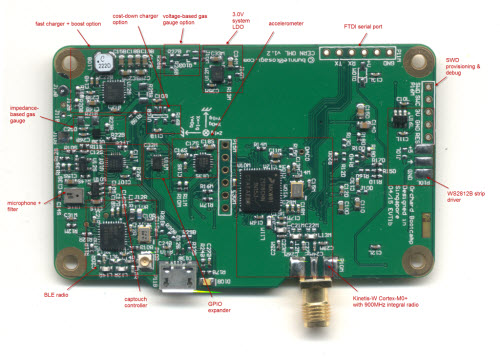Difference between revisions of "Orchard Main Page"
(→User Guides) |
|||
| Line 32: | Line 32: | ||
* [[Orchard Electronics Developer's Guide]] | * [[Orchard Electronics Developer's Guide]] | ||
* [[Orchard Mechanical Developer's Guide]] | * [[Orchard Mechanical Developer's Guide]] | ||
| + | * [[Orchard Manufacturing Developer's Guide]] | ||
=Source= | =Source= | ||
Revision as of 14:58, 2 July 2015
Orchard is a low-power, multi-band radio-connected embedded computing solution. In other words, it's an IoT platform.
Orchard is open source hardware and software.
Orchard is also a supply chain solution. Derivatives of Orchard are meant to be prototyped easily and brought to volume manufacturing with less effort than typical. Unlike breadboard solutions like Arduino, Orchard is targeted toward prototyping through board spins. This is possible thanks to China's low-cost prototyping infrastructure. The effort to prototype is higher than a breadboard, but the on-ramp to scale production once you've got your design finished is also less steep.
It is the foundation of the MIT Media Lab Summer Manufacturing Bootcamp, taught in Shenzhen, China, where students modify the Orchard platform electronics and plastics, and create their own scale-ready IoT device over a period of 5 weeks.
Our supply chain is currently not for sale -- we've got our hands full using it for Kosagi internal projects and for teaching students.
Basic feature set:
- Kinetis-W CPU
- 48 MHz Cortex-M0+
- 128k flash, 16k RAM
- 900 MHz radio with +13dBm transmit power (for long-range applications)
- BLE radio (for short-range, low power connection to IP gateways)
- 128x64 OLED
- 3-axis Accelerometer
- Microphone sensor
- Captouch button controller
- Lithium ion battery solution
- Gas gauge for accurate battery life determination
- Charging solution that can support high-capacity batteries
- Integral 5V boost

The firmware is ChibiOS 3.0, a lightweight, real-time operating system. We also use the ugfx libraries and libfixmath to implement a graphical UI and more advanced math capabilities.
User Guides
- Orchard Firmware Developer's Guide
- Orchard Electronics Developer's Guide
- Orchard Mechanical Developer's Guide
- Orchard Manufacturing Developer's Guide